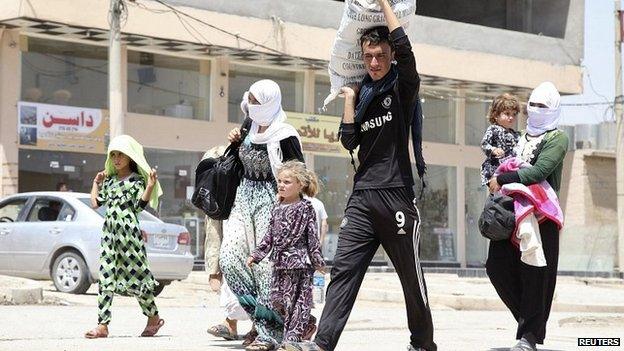UN alarm over fate of Iraqi Yazidi children
- Published

Displaced Yazidis from Sinjar have been arriving in Iraq's Dahuk province
The UN children's agency has expressed "extreme concern" over reports that 40 children from Iraq's Yazidi minority died after an offensive by jihadists.
Unicef says reports indicate the children died as a "direct consequence of violence, displacement and dehydration" over the past two days.
Thousands of Yazidis fled into the mountains after the Islamic State (IS) overran the town of Sinjar on Sunday.
Yazidis follow an ancient faith that jihadists condemn as devil worship.
"Families who fled the area are in immediate need of urgent assistance, including up to 25,000 children who are now stranded in mountains surrounding Sinjar and are in dire need of humanitarian aid, including drinking water and sanitation services," Unicef said.
BBC Arab affairs editor Sebastian Usher says the Unicef statement goes some way towards confirming some of the most disturbing reports coming out of the heartland of the Yazidi community.
Images posted on the internet showed small clusters of people gathered on the sides of a canyon in the Sinjar mountains.
There have been unconfirmed reports of massacres in Yazidi villages by the jihadists, our correspondent adds.
Jawhar Ali Begg, a spokesman for the Yazidi community, said on Monday that after overrunning Sinjar, IS (formerly known as Isis) had given them an ultimatum to convert to Islam, pay a tax or face death.

Who are the Yazidis?
Religious sect found in northern Iraq, Syria and the Caucasus
Religion incorporates elements of many faiths, including Zoroastrianism
Principal divine figure, Malak Taus (Peacock Angel), is the supreme angel of the seven angels who ruled the universe after it was created by God
Many Muslims and other groups view Yazidis as devil worshippers
There are estimated to be around 500,000 Yazidis worldwide, most living in Iraq's Nineveh plains
In August 2007 jihadists attacked Yazidi villages in Nineveh, killing between 400 and 700 people

"Their towns are now controlled by (the Islamic State) and their shrine has been blown up," he told the Associated Press news agency.
Sinjar fell along with the town of Zumar and two oilfields when IS attacked territory controlled by the autonomous Kurdistan Region.
Kurdish forces, known as Peshmerga, say they are planning a counter-attack and are calling in large numbers of fighters from other areas.
The Peshmerga have been battling militants for control of several towns stretching between the province of Nineveh and the Kurdish Iraqi province of Dahuk.
The weekend offensive by IS prompted Iraqi Prime Minister Nouri Maliki to order the air force to provide support to the Kurds on Monday.
It was the first sign of co-operation between Baghdad and the Kurdish region since Iraq's second-largest city, Mosul, was taken over by IS in June.
Correspondents said it indicated a degree of rapprochement in the face of the country's deteriorating security crisis.
Militants seized large swathes of northern Iraq in June and declared the land they control in Syria and Iraq a "caliphate".